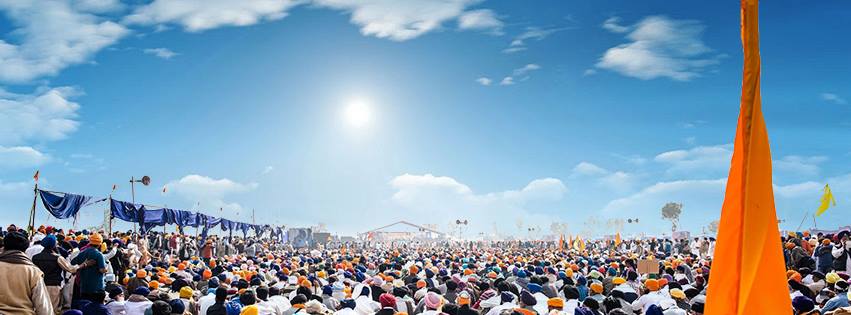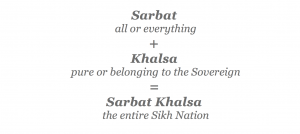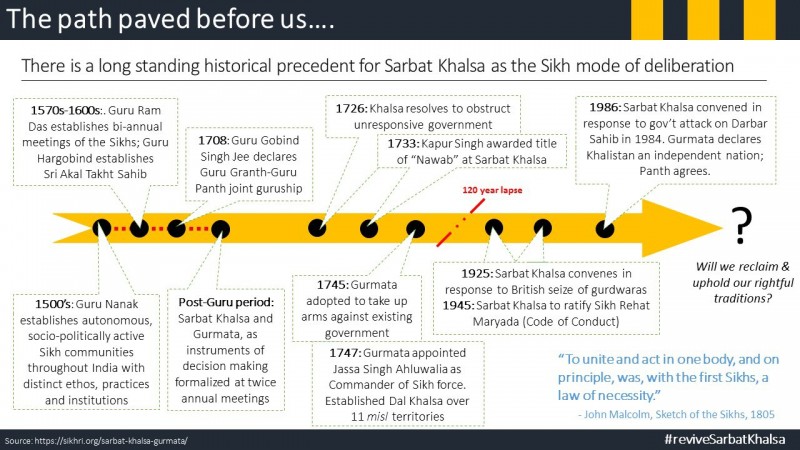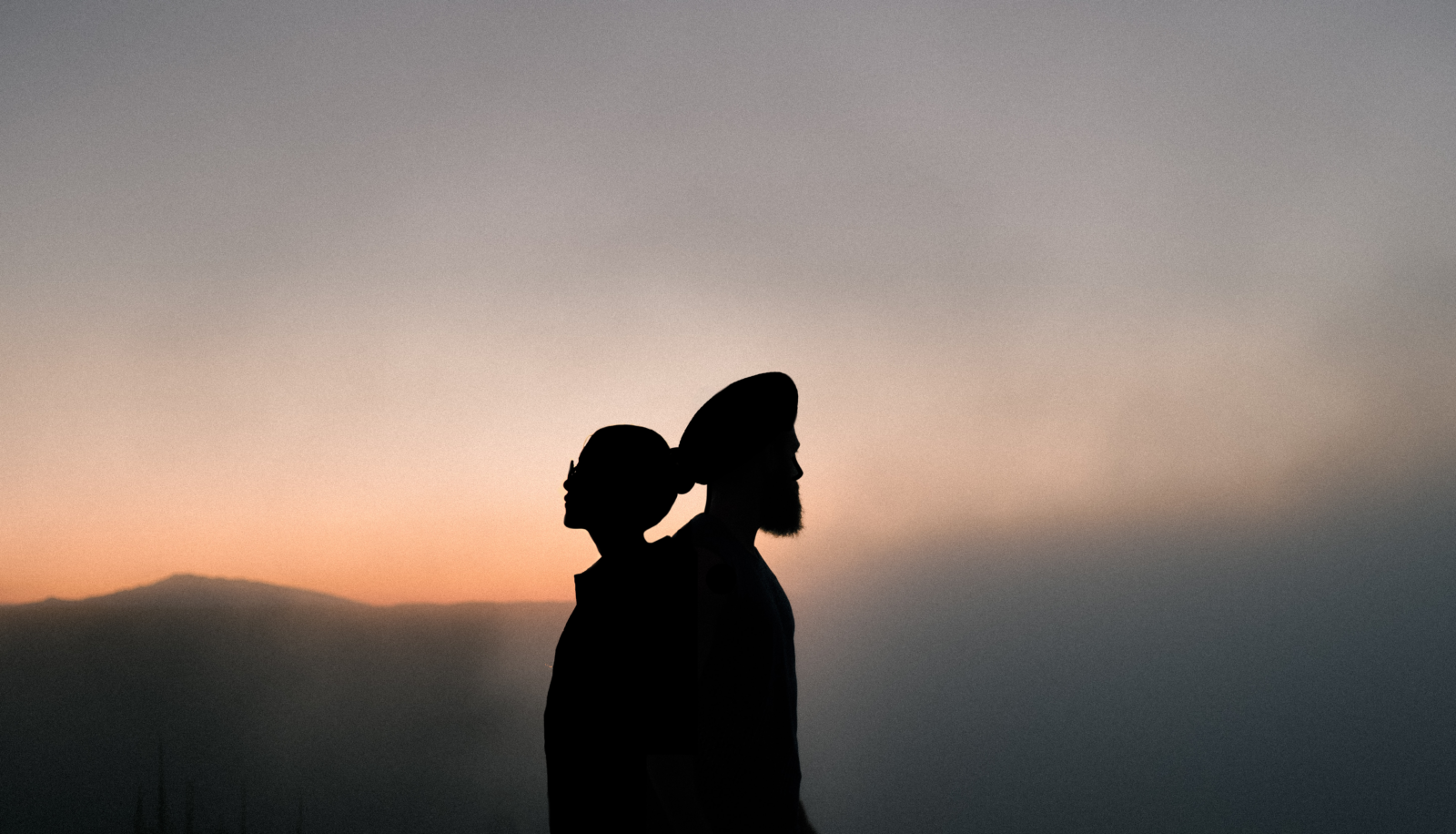“…Sarbat Khalsa, meeting in the presence of the Guru Granth Sahib, is the supreme sovereign body, with deliberative and executive powers, including authority to direct affairs of the community.”
– The Encyclopedia of Sikhism, Volume IV, Punjabi University Patiala, 1998
Dormant since 1986, many Sikhs are thrilled and elated that the Sikh institution of Sarbat Khalsa (ground assembly) has been revived. Hundreds of thousands attended the Punjab meeting while others in the diaspora live-streamed it. The hope for panthic growth and improvement is the in air. Sikh women and men across the globe participated locally in establishing regional resolutions and representatives then went to Punjab to deliberate and pass collective resolutions. The following article explains the history and process of Sarbat Khasla.
History
In 1708, Guru Gobind Singh Ji passed the guruship on to two entities the Guru Granth Sahib Ji and the Guru Khalsa Panth (community of amrit-dhari Sikhs). Since then, Sikhs consider the Guru Granth Sahib as our spiritual teacher and refer to the Guru Khalsa Panth as our political guide. This system made the Sikh concepts of miri (temporal power) and piri (spiritual power) tangible and accessible to Sikhs across the globe and into the future.
Historical, the Guru Khalsa Panth met regularly to discuss panthic matters and resolve disputes. In the 1700s, a large number of Sikhs would gather biannually, in Sarbat Khalsa, in Amrtistar, Punjab to convene in a deliberative assembly.
The first Sarbat Khalsa was called by Guru Gobind Singh Ji in 1708 and the last major Sarbat Khalsa was on January 26, 1986. During the 1700s, the Sarbat Khalsa would meet twice a year, sometime in October and April to deliberate on the religious and secular affairs confronting the panth.
In the past, the Sarbat Khalsa has passed gurmatas (resolutions in the name of the Guru) that addressed many topics such as: defending against Mughal armies, organizing jathas and misls (Sikh groups), removing British control of gurdwaras, creating the Sikh Rehat Maryada and in 1986, declaring Khalistan in light of Indian human rights abuses.
Process
A Sarbat Khalsa usually occurs at the Akal Takhat (the highest political institution of Sikhs) and in the presence of the Guru Granth Sahib Ji. The meeting starts with an ardas. Those gathered (usually representatives of Sikh communities across the globe) then nominate panj pyare to govern the mass meeting. The Sarbat Khalsa goes on to put up proposals for conversation. These proposals come from Sikhs, gurdwaras, and Sikh organizations; anyone in the Sikh panth, defined as a Sikh according to Sikh Rehat Maryada, may submit a proposed resolution. Next, the Sarbat Khalsa deliberates the proposed resolutions and strives to come to a decision. In an attempt prevent lobbying, bribery, and the suppression of marginalized voices, “majority rules” mentality does not exist and there is no voting at a Sarbat Khalsa. Instead, decisions are made unanimously and only the minimum everyone agrees to can be accepted. Resolutions must be in accordance with the spiritual teachings of Sri Guru Granth Sahib Ji.
The entire body of the Khalsa has to approve a resolution and once the it has reached consensus and passes it become a Gurmata (resolutions in the name of the Guru) and is binding on all Sikh; the panth is religiously and morally was bound to adhere to it. Then an action plan is created to carry out the Gurmata.
2015 Timeline
The following timeline is of North America and Punjab. If you would like to share the process in your country, please write to: info@KaurLife.org
Oct 12: Protests occurred in Punjab after perpetrators desecrated Guru Granth Sahib Ji by tearing out angs (pages) and scattering them in the streets. Indian police responded violently and killed several Sikh community leaders.
Oct 16 to 25: Gurdwara sangats around the United States met locally and created regional resolutions in light of the Punjab crisis. Sarbat Khalsa USA’s goal was to establish a shared repository of all the regional resolutions passed by the American Sikh Panth.
Oct 31: Sikhs representing around 100 gurdwaras and Sikh organizations of Canada and the United States met in Yuba City, CA to deliberate on Sikh crisis in Punjab. Panth Khalsa: North American Panthic Organization Meeting 2015 discussed the desecration of Guru Granth Sahib Ji and Indian state violence. They passed 3 resolutions and selected 5 representatives to attend the Sarbat Khalsa in Punjab.
Nov 6: The North American Sikh delegation arrived in Punjab. Members included Harinder Singh, Manjit Singh Uppal, Manjit Singh Brar, Resham Singh, and Yadwinder Singh. The delegation’s purposes was to dialogue on how to establish an independent Akal Takhat Sahib and revive the Sarbat Khalsa tradition. These objectives were the direct outcomes of the Yuba City meeting. Read more here.
Nov 8: The North American Sikh delegation met with jathebandis (Sikh communities) to gain alignment for the upcoming Sarbat Khalsa. Read more here.
Nov 10: The Sarbat Khalsa met in Chabba, Amritsar, Punjab. Over 600,000 Sikhs attended and millions watched across the globe. 13 Gurmatas (resolutions) were passed and read by the organizers.
April 2016: The next Sarbat Khalsa will be held on Vaisakhi of 2016.
How can you get involved?
- Be present at local Sarbat Khalsa meetings held at your gurdwara or by Sikh organizations. If they do not exist, start one!
- Follow organizing groups on Twitter & Facebook, and subscribe to their newsletters:
Regional Sarbat Khalsa Meetings in the USA
Website: http://sarbatkhalsausa.com
Facebook: https://www.facebook.com/revivesarbatkhalsa
North American Delegation
Website: http://www.sarbatkhalsainfo.com
Facebook: https://www.facebook.com/Sarbat-Khalsa-2015-157149624639776
Twitter of Delegate Harinder Singh: https://twitter.com/1Force
International Sarbat Khalsa in Punjab
Website: http://www.sarbatkhalsa2015.com
Facebook: https://www.facebook.com/2015sarbatkhalsa
Twitter: https://twitter.com/Sarbat_khalsa15
3. Self Education:
Read the Sikh Research Institute article: Sarbat Khalsa & Gurmatas
“To unite and act in one body,
and on principle,
was with the first Sikhs,
a law of necessity.”
– John Malcolm, Sketch of the Sikhs 1805
Share your thoughts and experience of the Sarbat Khalsa with Kaur Life!
Write to us at: info@KaurLife.org
Sources:
- Regional Sarbat Khalsa Meetings in the USA
- North American Delegation
- International Sarbat Khalsa in Punjab
- Sikh Research Institute
- Sarbat Khalsa. SikhiWiki
- A Brief History of Sikh Misls. Sikh Missionary College
- Takhts, Jatedars and Legal Provisions by Kashmir Singh
- European Accounts of Sikhs
- Photo by Singh TejInder of The Anad Foundation






